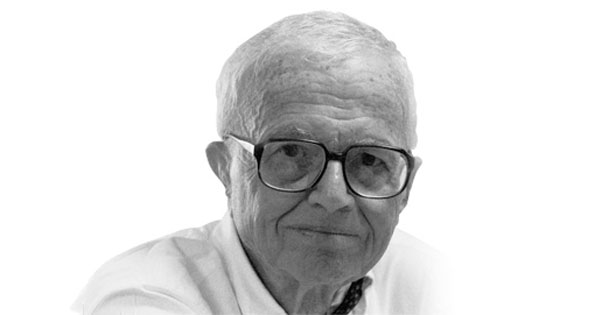
William Zinsser was my teacher some four decades ago, and we remained friends ever since. That prompts two remarkable thoughts. First, how many of us are close to a college teacher years later? And second, in Bill’s case, the answer was dozens, in person, and millions, through On Writing Well and his many other books.
Bill’s instruction—in his seminar at Yale’s Branford College, where he was master, and through his articles, his books, and his innumerable visits to eager learners at schools and campuses and corporations throughout the land—combined stern discipline with genuine understanding and warmth. You could not commit sins that misled, confused, or lost your reader. But adhering to the rules of simplicity, clarity, vigor, and so on was genuinely hard work, grounded in human strengths and frailties.
When I learned of Bill’s death this morning, in a message from Mark Singer of The New Yorker—who studied with Bill, worked with him, and cherished him as a friend longer than I had the privilege—I was sent back to Bill’s words and their lingering effect. I liked a post from Roy Peter Clark at Poynter.org, “Why William Zinsser’s writing book is still number one.” Clark refers to pages 10 and 11 of On Writing Well, the indelible passages where Bill demonstrates how he edited himself. There, he showed how he reduced lines that went
[the reader] … is too dumb or too lazy to keep pace with the writer’s train of thought. My sympathies are entirely with him. He’s not so dumb. If the reader is lost, it is generally because the writer of the article has not been careful enough to keep him on the proper path.
to the incomparably better:
… is too dumb or too lazy to keep pace with the train of thought. My sympathies are with him. If the reader is lost, it is generally because the writer has not been careful enough to keep him on the path.
None of us could ever do this to our own prose. Lord knows, we tried. We loved Bill, and wanted to remain in touch with him, because he gave us a standard to strive for in practicing our craft. Occasionally, we felt the joy of knowing we had reached that standard.
But Bill wanted more than the virtue of craft honorably practiced. He situated the work in character. You had to do your best work on behalf of readers because it mattered, to them and to you. Your best writing came from who you were and how honestly you took stock of yourself. It was a lesson in craft embedded in life, and always enlivened by humor.
It is no surprise, therefore, that he also taught us about life at its end, in the few years since he completed his zesty American Scholar columns happily collected in The Writer Who Stayed. The people who visited Bill regularly in his last years—to read to him weekly, to share jokes and baseball stories—and those, like me, farther away, who visited only occasionally—all of us held his hand, helped him sit up, tried to make him comfortable while we talked. He always welcomed that, made it natural and affectionate.
From the time we first met him until his death this morning, those were the things that made Bill Zinsser the best teacher and one of the finest friends any of us ever had.
Read one of William Zinsser’s most memorable essays from the Scholar here.

